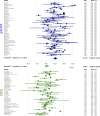Accuracy of Quick Sequential Organ Failure Assessment Score to Predict Sepsis Mortality in 121 Studies Including 1,716,017 Individuals: A Systematic Review and Meta-Analysis
- PMID: 32166285
- PMCID: PMC7063937
- DOI: 10.1097/CCE.0000000000000043
Accuracy of Quick Sequential Organ Failure Assessment Score to Predict Sepsis Mortality in 121 Studies Including 1,716,017 Individuals: A Systematic Review and Meta-Analysis
Abstract
We performed a meta-analysis to assess whether the newly introduced quick Sequential Organ Failure Assessment score could predict sepsis outcomes and compared its performance to systematic inflammatory response syndrome, the previously widely used screening criteria for sepsis.
Data sources: We searched multiple electronic databases including MEDLINE, the Cochrane Library, Embase, Web of Science, and Google Scholar (up to March 1, 2019) that evaluated quick Sequential Organ Failure Assessment score, systemic inflammatory response syndrome, or both (International Prospective Register of Systematic Reviews [PROSPERO]: CRD42018103327).
Study selection: Studies were included if the outcome was mortality, organ dysfunction, admission to ICU, ventilatory support, or prolonged ICU stay and if prediction performance was reported as either area under the curve, odds ratio, sensitivity, or specificity.
Data extraction: The criterion validity of the quick Sequential Organ Failure Assessment score and systemic inflammatory response syndrome criteria were assessed by measuring its predictive validity for primary (mortality) and secondary outcomes in pooled metrics as mentioned. The data were analyzed using random effects model, and heterogeneity was explored using prespecified subgroups analyses.
Data synthesis: We screened 1,340 studies, of which 121 studies (including data for 1,716,017 individuals) were analyzed. For mortality prediction, the pooled area under the curve was higher for quick Sequential Organ Failure Assessment score (0.702; 95% CI, 0.685-0.718; I 2 = 99.41%; p < 0.001) than for systemic inflammatory response syndrome (0.607; 95% CI, 0.589-0.624; I 2 = 96.49%; p < 0.001). Quick Sequential Organ Failure Assessment score consistently outperformed systemic inflammatory response syndrome across all subgroup analyses (area under the curve of quick Sequential Organ Failure Assessment vs. area under the curve of systemic inflammatory response syndrome p < 0.001), including patient populations (emergency department vs ICU), study design (retrospective vs prospective), and countries (developed vs resource-limited). Quick Sequential Organ Failure Assessment score was more specific (specificity, 74.58%; 95% CI, 73.55-75.61%) than systemic inflammatory response syndrome (specificity, 35.24%; 95% CI, 22.80-47.69%) but less sensitive (56.39%; 95% CI, 50.52-62.27%) than systemic inflammatory response syndrome (78.84%; 95% CI, 74.48-83.19%).
Conclusions: Overall, quick Sequential Organ Failure Assessment score outperforms systemic inflammatory response syndrome in predicting sepsis outcome, but quick Sequential Organ Failure Assessment score has relative strengths/weaknesses (more specific but less sensitive) compared with systemic inflammatory response syndrome.
Keywords: meta-analysis; mortality; quick Sequential Organ Failure Assessment; sepsis; systemic inflammatory response syndrome.
Copyright © 2019 The Authors. Published by Wolters Kluwer Health, Inc. on behalf of the Society of Critical Care Medicine.
Conflict of interest statement
The authors have disclosed that they do not have any potential conflicts of interest.
Figures


References
-
- Reinhart K, Daniels R, Kissoon N, et al. Recognizing sepsis as a global health priority - A WHO resolution. N Engl J Med 2017377414–417 - PubMed
Publication types
LinkOut - more resources
Full Text Sources

